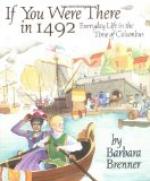In the course of the voyage that then ensued, the admiral made many important discoveries, amongst them Jamaica, and the cluster of little islands called the “Garden of the Queen.” The navigation amongst these islands was so difficult, that the admiral is said to have been thirty-two days without sleeping. Certain it is, that after he had left the island called La Mona, and when he was approaching the island of San Juan, a drowsiness, which Las Casas calls “pestilential,” but which might reasonably be attributed to the privations, cares, and anxieties which the admiral had now undergone for many months, seized upon him, and entirely deprived him for a time of the use of his senses.
The object in going to San Juan was to capture cannibals there, and Las Casas looks upon this lethargical attack as a judgment upon the admiral for so unjust a manner of endeavouring to introduce Christianity. The mariners turned the fleet homewards to Isabella, where they arrived the 29th of September, 1494, bearing with them their helpless commander.
Illness of Columbus.
On Columbus’s arrival at Isabella, where he remained ill for five months, he found his brother, Bartholomew Columbus, whose presence gladdened him exceedingly. His brothers were very dear to the admiral, as may be gathered from a letter to his eldest son Diego, in which he bids him make much of his brother Ferdinand, the son of Beatrice, “for,” says he, “ten brothers would not be too many for you. I have never found better friends, on my right hand and on my left, than my brothers.” Afterwards came Antonio de Torres with provisions, and all things needful for the colony. But nothing, we are told, delighted the admiral so much as the despatches from court, for he was a faithful, loyal man, who loved to do his duty to those who employed him, and to have his faithfulness recognized.
Disorganization of the colony.
Peace or delight, however, was not at any time to be long enjoyed by Columbus. He found his colony in a sad state of disorganization: the Indians were in arms against the Spaniards; and Father Buil, Don Pedro Margarite, and other principal persons had gone home to Spain in the ship which had brought Bartholomew Columbus.
The admiral, before his departure, had given a most injudicious command to Margarite, namely, to put himself at the head of four hundred men and go through the country, with the twofold object of impressing upon the natives a respect for the power of the Spaniards, and of freeing the colony from supporting these four hundred men. The instructions to Margarite were, to observe the people and the natural productions of the country through which he should pass; to do rigorous justice, so that the Spaniards should be prevented from injuring the Indians, or the Indians the Spaniards; to treat the Indians kindly; to obtain provisions by purchase, if possible, if not, by any other means; and to capture Caonabo and his brothers, either by force or artifice.




